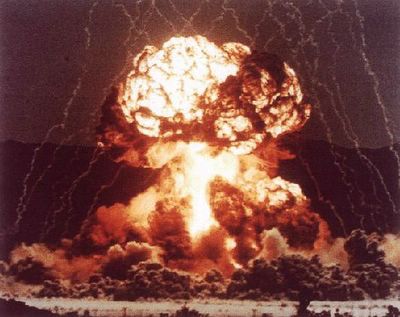While I know there are pressing issues out there such as Brad and Jennifer and the Michael Jackson trial, there are also other things that deserve your undivided attention, like nuclear terrorism. Paranoia you say? The stuff of Tom Clancy novels you say? Well, I'll bet you would have said the same thing about airliners being flown into the World Trade Center - on September 10, 2001.
This National Journal article by Siobhan Gorman and Sydney Freeberg discusses the very real possibility of an event that would make 9/11 look like a minor ripple and it should be read in its entirety. An excerpt:
The Port of Los Angeles -- Twelve thousand times a day, the hulking cranes outside Noel Cunningham's office unload another shipping container. Any one of
them could conceal a nuclear weapon -- and Cunningham's first clue, he fears,
might be a blinding flash outside his window. As director of operations and
emergency management for the Port of Los Angeles, Cunningham is responsible for securing a facility which, together with the neighboring Port of Long Beach, is
the gateway for 44 percent of the goods that come into the United States. A bomb
that gets through here is just a drive down the highway from any city in 48
states. "All the other threats, we can deal with," Cunningham says. "But the
nuclear threat is probably the one we wouldn't recover from."
Cunningham's security challenge is hardly unique: America's porous borders and winding coastlines are impossible to fortify against bad people determined to get bad things into this country. The security consensus since 9/11 is that government officials should do everything they can to catch terrorists before they can launch an attack, but that they must realize they won't be able to catch all of them. The equation regarding the nuclear threat is different, however: Letting just one nuclear bomb through carries unacceptable costs -- mortal, economic, and psychological. So, this threat demands a response that -- ideally -- leaves nothing to chance.With that in mind, shortly after the 9/11 attacks, Cunningham and his Long Beach counterpart commissioned nuclear-security workups of their ports. The conclusion: Port officials could get the best protection against attacks by persuading officials abroad to tighten security at the foreign ports that feed shipments into Los Angeles and Long Beach. That's the mission that Cunningham and his colleagues began to pursue, at first meeting considerable push-back from the U.S. government. Now, their approach is a national model.
"The good news and the bad news is that Los Angeles is the best in the country," says University of California (Los Angeles) public policy professor Amy Zegart. She gives it a grade of C. A security expert who has studied the Los Angeles-Long Beach port complex extensively, Zegart says that while Los Angeles has made more headway than any other jurisdiction, even after "superhuman effort" to coordinate jealously independent agencies, its security system remains full of holes, both technological and political.
The story is similar at the national level. Adm. James Loy, who until recently was the deputy secretary of the Homeland Security Department, recalled a series of "Deputies Committee" meetings in the White House Situation Room in early 2004 at which federal security officials expressed nagging worries about efforts to combat nuclear terrorism. This was the one threat that required a "zero-tolerance policy," Loy said, and current efforts weren't cutting it. Within months, Loy would become one of the leading advocates in the federal government for a new office dedicated to bolstering the country's nuclear-detection policy and technology. In Loy's vision, this office would drive a "mini-Manhattan Project" to push for a technological breakthrough that could revolutionize America's ability to detect nuclear material at its borders, inside its borders, and around the world. The proposal for the Domestic Nuclear Detection Office made its debut in the president's 2006 budget request.
But headway has been modest, at best. Many critics say the security system currently under development for ports and border crossings has inherent flaws. The chief weakness is that the system depends on newly installed "radiation portal monitors" -- which can't reliably detect the most-likely-to-be used material: highly enriched uranium. Nor can the monitors detect a shielded dirty bomb. And even if the devices could detect every type of nuclear material, as outgoing House Homeland Security Chairman Christopher Cox, R-Calif., points out, the current system assumes "that terrorists will do us a favor by bringing their nuclear material through a radiation portal monitor."
If 9/11 taught us anything it taught us that fiction can become horrifying reality in a matter of seconds. This is why it is imperative that we should not only continue to seek out those who would perpetrate such an act abroad, but we should also be ever vigilant at home.
The liberation of Iraq and the growing movement toward democratization in the Middle East is making a lot of people nervous, people with a great deal of money and a virulent hatred of the United States. These people want us dead, they want our civilization destroyed. Those who would distract us with "Koran desecration" stories are fools (or worse) and they obfuscate the monsterous nature of our enemy.
Yesterday's fiction is today's history. Consider the possibilities, for to ignore them may bring a future too horrible to imagine.



No comments:
Post a Comment